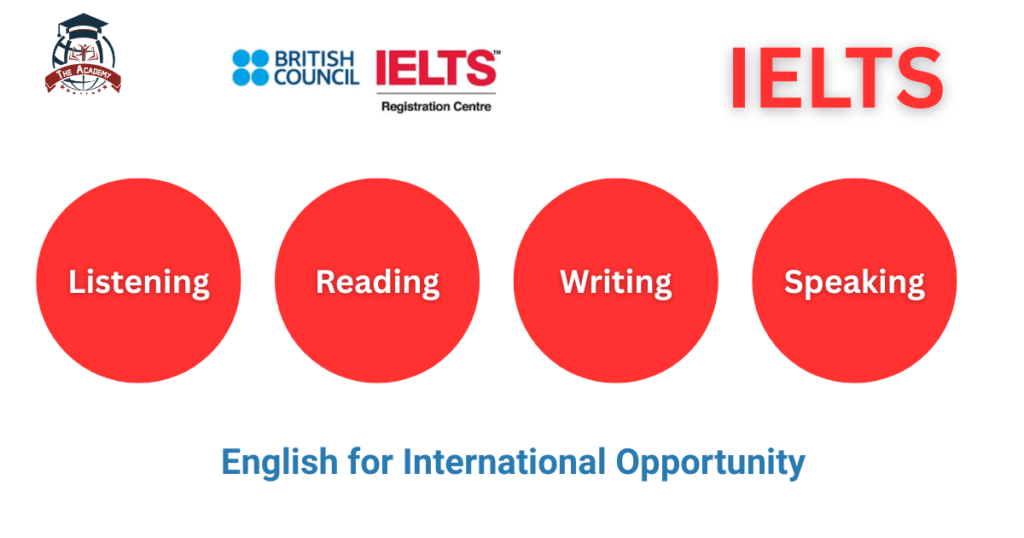IELTS 2025: Your Ultimate Global Gateway to Success
The International English Language Testing System (IELTS) is one of the most widely recognized English proficiency tests in the world. It is designed to assess the language skills of non-native English speakers who need to study, work, or migrate to English-speaking countries. IELTS is accepted by over 10,000 institutions across 140 countries, including universities, employers, and immigration authorities.

Why is IELTS Important?
Whether you’re applying for university admission, seeking employment, or planning to migrate, the IELTS test provides a fair and accurate measure of your English proficiency. IELTS evaluates your abilities in four key areas:
- Listening
- Reading
- Writing
- Speaking
Scores are given on a band scale from Band 0 (no attempt) to Band 9 (expert), helping institutions, employers, and governments assess your English communication skills.
IELTS Academic vs IELTS General Training
IELTS is available in two formats: IELTS Academic and IELTS General Training. The key difference lies in the focus and purpose of the test.
IELTS Academic
This version is intended for individuals applying to undergraduate or postgraduate programs in English-speaking countries. It evaluates your ability to handle academic language and complex texts.
- Reading: Three long academic passages.
- Writing: A data description (Task 1) and an academic essay (Task 2).
- Listening: Similar to the General Training, but with academic topics.
- Speaking: Focus on academic discussions and formal language.
IELTS Academic is ideal for those aiming for university studies or professional registration.
IELTS General Training
IELTS General Training is intended for individuals who are applying for migration or vocational training in English-speaking countries. It focuses on practical English used in everyday situations.
- Reading: Shorter passages related to social and workplace contexts.
- Writing: A letter (Task 1) and an essay on a general topic (Task 2).
- Listening: Similar to the Academic version, but focuses on practical, everyday scenarios.
- Speaking: A personal interview assessing fluency in social and workplace settings.
IELTS General Training is ideal for migration, work, and vocational training purposes.
IELTS Exam Bodies
IELTS is co-owned by three global organizations, ensuring the highest standards and credibility:
- British Council: Offers global test preparation resources and expertise.
- IDP: IELTS Australia: Responsible for test delivery and registration in many regions.
- Cambridge Assessment English: Develops and maintains the test, ensuring its academic integrity.
IELTS Exam Registration
Registering for the IELTS exam is simple:
- Choose Your Test Type: Decide between Academic or General Training based on your needs.
- Find a Test Center: Use the official IELTS website to find a nearby test center.
- Select Your Test Date: Ensure you choose a date that works best for your schedule.
- Create an Account: Register through the British Council, IDP, or Cambridge website.
- Submit Identification: Provide a valid passport or national ID.
- Payment: Pay the registration fee, which varies by location.
IELTS Exam Format
The IELTS exam is made up of four sections:
- Listening: 40 questions, 30 minutes
- Reading: 40 questions, 60 minutes
- Writing: 2 tasks, 60 minutes
- Speaking: 3 parts, 11-14 minutes
IELTS Results
Results are available 13 days after the test. You will receive your band scores for each section as well as your overall score, ranging from Band 0 to Band 9.
IELTS is your gateway to a world of academic, professional, and immigration opportunities. Whether you’re taking IELTS Academic for university admission or IELTS General Training for migration, thorough preparation is key to achieving your desired band score. The exam is recognized globally, making it a trusted measure of your English language proficiency.
For expert resources, preparation tips, and guidance, explore The Academy of IELTS.
